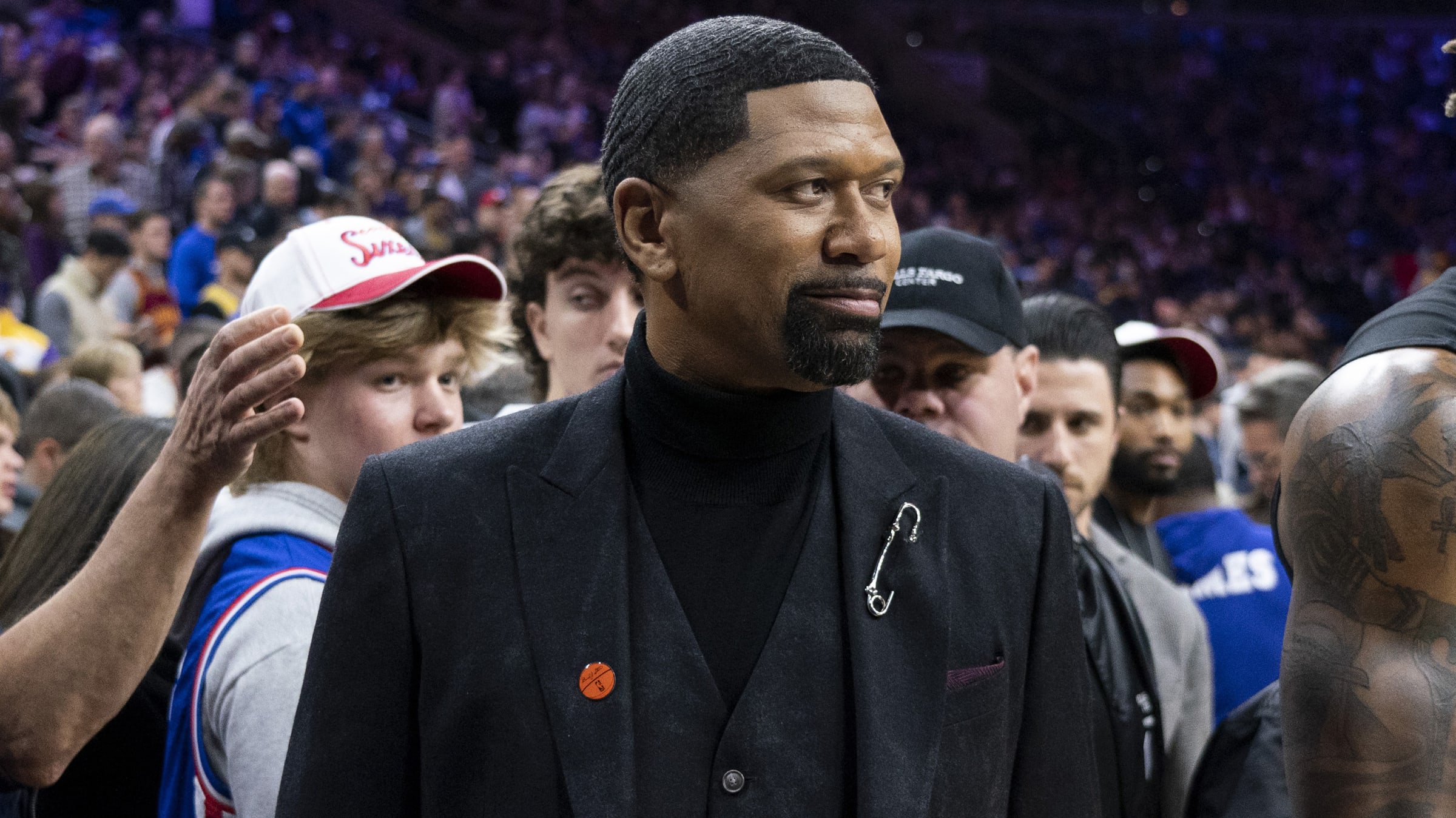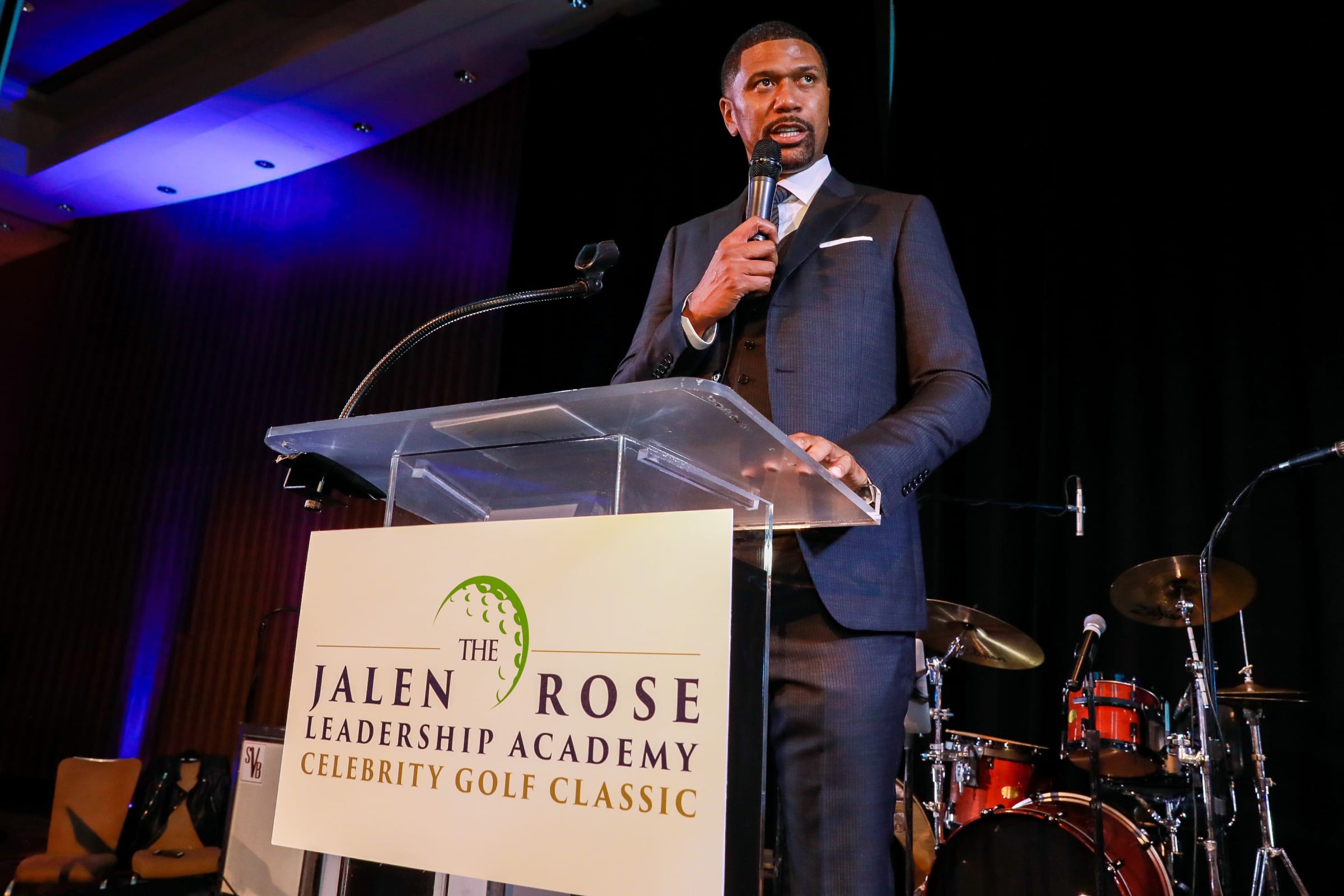Daily Beast: Jalen Rose on Teaming With LeBron James to Swing the 2020 Election: ‘Voting Is Like Breathing’
June 26, 2020

The former NBA star turned sports analyst opens up to Robert Silverman about his new voting-rights initiative with King James, speaking his mind at ESPN, and much more.
The photo was snapped on June 4, 1967. Behind a podium, a dozen athletes had assembled in Cleveland, Ohio, at the Negro Industrial and Economic Union. Seated in the front row were four of the greatest and, at the time, most famous Black athletes in America: Bill Russell, Muhammad Ali, Jim Brown, and Kareem Abdul-Jabbar (née Lew Alcindor). Five weeks earlier, Ali had made it clear he would not comply with his local draft board to serve in the Vietnam War, citing a religious objection. Stripped of his heavyweight title crown and suspended by boxing, he was staring down the barrel of a possible five-year prison sentence and five-figure fine.
The original goal of the meeting, arranged by the sport’s power brokers, was to convince Ali to settle with the government and return to the ring where a hefty payday awaited him. Ali wouldn’t budge. The presser, which the assembled media assumed had been called to celebrate Ali’s return to prizefighting, became a show of solidarity. To a man, the athletes backed Ali, even though they didn’t all agree with his anti-war stance.
For Jalen Rose, former NBA star and current ESPN analyst and commentator, “That’s the most iconic picture in the history of sports,” he said when reached by phone. The 47-year old Rose, a partner in LeBron James’s recently announced voting-rights nonprofit, stressed that its importance some 50-odd years after the fact had little to do with sport qua sport. “Guess what?” he noted. “They were not at a game. They were not at a game.”
The photograph came immediately to mind when asked about the NBA’s imminent return. Some of Rose’s colleagues at ESPN—Stephen A. Smith and Michael Wilbon being two of the more prominent examples—had argued that returning to play in a highly policed, semipermeable Disney World bubble was not only in their best financial interest, but would provide the largest possible stage, should they wish to express any non-basketball thoughts.
Rose disagreed, respectfully. “Any person who makes that argument, the first thing they say is about the money,” he said, both the potential financial impact on the league as a whole and the players themselves.
“The difference with these athletes is they are the stage in 2020,” Rose continued, his voice rising at the end of the sentence to hammer his point home—a cadence and rhetorical style well-recognizable to anyone who’s caught his appearances on numerous broadcasts over the last decade. “The NBA has the largest stage not only in professional sports, but one of the largest stages of conglomerates for Black men in the world.”
Unlike Craig Hodges, Rose is not openly advocating for a walkout, instead advising players to follow the dictums of their heart. He believes the season will commence as scheduled, but worries about the ongoing pandemic—and the desire to impact social change amidst a growing movement should not be discounted. Were players to deem the demands of their employers secondary to the needs of their communities and take their arguments to cities all across America, Rose is certain the press would follow, just as they’d done for Ali, Abdul-Jabbar, Brown, and Russell way back when.
Despite earnings that pale in comparison to modern athletes, in that moment, those stars of yore realized the power and influence they really held. And they were able to access it by refusing, both figuratively and literally, to play ball. “That creates the power,” said Rose.
Rose was born in 1973 in Detroit. Raised by a single mother, he and his brothers had to go without the bare necessities. “No electricity, no hot water, no heat—at times we struggled,” he told ESPN. “We’d wake up in the morning and wash with water we heated on a hot plate. And we’d go to bed at night wearing skull caps, sweat shirts and gloves.” The family did so without any help from Walker’s biological father, Jimmy Walker, himself a two-time NBA All-Star, whose identity was kept secret from Rose throughout most of his childhood. (Walker passed away in 2007 before the two ever had the chance to meet face-to-face, let alone reconcile.)
On the basketball court, the 6-foot-8 Rose thrived, eventually earning a scholarship from Michigan. There, he starred on the fabled Fab Five alongside Chris Webber and Juwan Howard. He went on to a 13-year career in the NBA, including stints in Indiana, Chicago, New York, Toronto, and Phoenix. At his peak, Rose was a devastating scorer, facilitator, and slasher. He topped out at 22.3 points per game with the Bulls in 2003, and helped lead the Pacers to multiple deep playoff runs, including a trip to the Finals in 2000, when he was named the NBA’s Most Improved Player.
But throughout his playing days, Rose had a secondary, if less public objective: to make sure, post-career, that whenever invited on-air or speaking to young people, or raising funds for social justice causes, he would be considered the equal of any éminence grise standing by his side. Or as he put it: “I never wanted to be in a position where somebody could consider me a dumb jock.” Rose takes great pride not just in his degree from Michigan, but his inclusion on the honor roll and the Dean’s List. While the public tabulated his worth in terms of the numbers on the stat sheet, those accomplishments always were of the utmost importance.
The years Rose spent circumnavigating the globe as an athlete only served to highlight the fiscal imbalances and systemic racism inherent in American life. “When zip codes change, the quality of the facility and the access to whatever is needed for the team—uniforms, travel—changes,” he said. “You start to learn, just like anything else in our country, education has a cost.” Rose rattled off a set of grim statistics about families who can afford the hundreds of thousands spent on private schools, and the vast chasm between spending on public schools in the suburbs versus the inner cities. “The logic that the government gives you as a tax-paying citizen is: Oh they pay more in income tax—they should have better facilities. They should have the best schools. Oh, OK,” said Rose. “It’s systematic.”
In 2011, he founded the Jalen Rose Leadership Academy, a charter schoollocated a mere two miles from his childhood home, with 400-plus students currently enrolled. It’s an attempt to level that playing field, said Rose, giving students who the education system doesn’t view as “cute and cuddly” the tools required to compete in collegiate classrooms, starting in the ninth grade and continuing through completion of college, or trade school. “That’s the eight most important years of a young person’s life,” he said. “That is how I try to lift the fortunes of people that have been oppressed for a really long time in this country.”
Education hasn’t been his only cause. He has railed against the legalized wage suppression enabled by the NCAA, describing the century-old collegiate system as “indentured servitude” in 2018, and calling for a boycott of March Madness that same year. Nor would he permit the NCAA to suggest that its recent offering—allowing players to profit from licensing their names, with restrictions as to total earnings—in any way rectified the imbalance, calling it “laughable.”
(The corruption inherent in the enforcement of amateurism is a subject Rose is certainly familiar with. In 2002, the NCAA scrubbed Michigan’s 1992 and 1993 appearances in the Final Four from the record books for accepting improper benefits).
When the NFL set up a cursory workout for Colin Kaepernick and then seemed to do everything in their power to sabotage it, Rose wouldn’t let the league get away with such a patent hypocrisy:
Recently, Rose, LeBron James, and other NBA athletes launched a new 501(c)(4), More Than a Vote, an organization dedicated to guarding voting rights and increasing participation, particularly in communities of color. “We’ve had voter suppression for so long,” he said in a Zoom broadcast transcribed by Bloomberg. “People not understanding how they can vote, where they can vote, if their vote really counts.”
Rose added to The Daily Beast: “Voting is like breathing. It’s your right.” The idea is that making one’s voice heard as a citizen shouldn’t be seen as “political,” but both sides of the aisle have been guilty of that framing.
“The unfortunate part of that is, other than Barack Obama, we as Black people haven’t really… looked at the two candidates and seen someone who could represent our best interests,” he said. “That can be depressing.”
And as a mass uprising has formed across the U.S. with people of all races uniting to condemn the persecution and violence suffered by people of color at the hands of law enforcement, Rose wouldn’t remain silent, even on an at-times, politics-averse network like ESPN.
“I wish America loved Black people as much as they love Black culture,” he said.
When Rose talked with The Daily Beast, he stressed that he’d never been asked to hold back from speaking his mind, or told to soften his blows. If nothing else, his grueling schedule seems to confirm the network’s approval. Rose co-hosts Jalen & Jacoby on ESPN Radio as well as the morning talk show Get Up!, and makes frequent appearances on both SportsCenter and NBA Countdown. As to the bad-faith criticisms of ESPN and the idea it’s a haven for radical leftist ideas (Rose mentioned the frequent use of the term “WokeCenter”), he doesn’t give it much credence. That kind of “coded language,” he said, has been tossed in his face going back to his high school and college days. The intent isn’t to engage in substantive debate; rather, it serves to signify that “It’s OK to entertain and/or to provide labor,” Rose explained. Those who are stomping their feet make it clear they “don’t care about [our] oppression and opinion.”

The entire question of sports as escapism or a refuge from political forces falls in this category, too. The “disconnect” allowing a person to separate, say, Brown’s or Ali’s or Russell’s job from their social and political activism is in and of itself a privilege, and one afforded almost entirely to white people. “Black people never felt that way,” he said.
The ongoing protests have been both a source of inspiration and suspicion for Rose. Partly, he’s hopeful that the increased public approval of the Black Lives Matter movement is derived from education and growth. On the other hand, “The skeptic in me says that behavior doesn’t necessarily change overnight.” The growing acceptance of Juneteenth as a national holiday, the removal of Confederate statues, and the rejection of the Confederate flag are all undoubtedly positive indicators. But when it comes to the NFL or any other corporate entity swearing they’ll re-evaluate hiring policies, “I’ll believe it when I see it,” said Rose.
The diversity seen in the protests scans as a step in the right direction, too, according to Rose. But he can’t ignore the fact that President Trump had planned to hold a rally on Juneteenth in Tulsa, 99 years after the destruction of Black Wall Street. Whether that decision was borne from racial animus or ignorance is irrelevant at a certain point. “You don’t deserve us trying to sort out the difference,” he said.
Watching that sea of upturned faces tittering as the president slung racial slurs, lied through his teeth, and tried to wish the novel coronavirus away, Rose couldn’t help but think: “We’ve come so far, but we still have so very far to go.”


